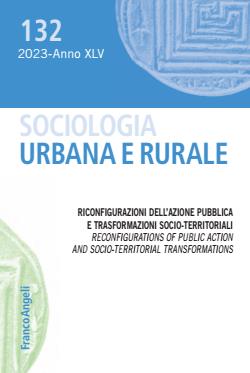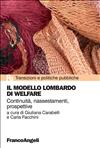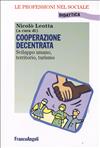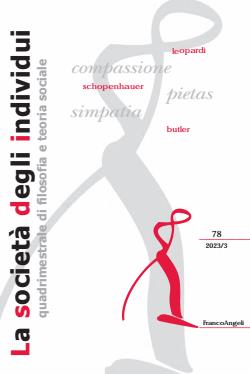
LIBRI DI ENZO MINGIONE
La ricerca ha estratto dal catalogo 26 titoli


L’articolo discute di innovazione sociale sulla base dell’analisi di Polanyi e di Marshall e dei contributi successivi che si sono sviluppati a partire da quel quadro teorico. Le ragioni dell’innovazione sociale vengono interpretate alla luce della crisi del welfare capitalism e dei disequilibri che si sono manifestati nelle istituzioni fonti di integrazione e coesione sociale. Gli autori propongono una valutazione dei processi e delle esperienze di innovazione sociale che ne mette in luce la rilevanza, ma anche l’ambivalenza e i limiti nel rispondere alla crisi.


Il volume, con l’intento di proporre una serie di approfondimenti sui principali ambiti di cambiamento del lavoro, considera alcuni fra i più significativi ambiti problematici e alcune sfide per il futuro, e si chiude con una riflessione sullo specifico contributo che la sociologia del lavoro può dare, così come ha fatto finora, all’analisi del mondo del lavoro.
cod. 1529.2.114

Continuità, riassestamenti, prospettive
Il volume, rivolto non solo a studiosi di politiche sociali, ma a decisori politici, responsabili dei servizi e professionisti del sociale, analizza la legge regionale lombarda n. 3/2008, che disciplina in modo organico i servizi sociali, unitariamente con i servizi socio-sanitari, in un’ottica di reciproca integrazione. L’analisi permette di ricostruire il modello lombardo di welfare nei suoi elementi costitutivi e nel suo contesto, e di interrogarsi sulla sua evoluzione, anche alla luce della prima fase di attuazione della legge.
cod. 524.14

Lo stato del Paese agli inizi del XXI secolo
Un affresco della situazione del paese tracciato dai sociologi italiani, nella diversità dei loro approcci, empirici e teorici. Il volume, promosso dall’Associazione Italiana di Sociologia, non è destinato agli specialisti ma a un più vasto pubblico di lettori interessati a comprendere la contemporaneità.
cod. 1420.1.119

Economia e economia informale - Ethics and enterprises: a new and different approach to the theme The author re-reads the relationship between ethics and enterprises in the light of Polanyi’s thought, advancing an open proposal, which is methodological and implies a macro point of view, and which involves all the social subsystems. In order to define the nature of ethics it is important to consider that it is essential to the life itself of enterprises and, according to Granovetter, to reconsider the idea that the economic action (rational action toward the aim) is a social action. This perspective highlights a different interpretation of ethics, which depends on the consideration of the enterprise without society, of the enterprise as autonomous from society and of the enterprise in the society, that is, as part of a logic of action coherent with the values of society.

Sviluppo umano, territorio, turismo
I modelli locali di sviluppo sostenibile, itinerari diversi che forniscono un ricco caleidoscopio di esperienze concrete e modelli teorici di riferimento, con lo scopo di: favorire un approccio multilaterale che prediliga lo strumento dei “partenariati territoriali di lungo periodo”, perseguire una gestione partecipata e decentralizzata dei fondi, costruire reti territoriali di comunicazione per promuovere l’heritage culture e consolidare le capacità locali…
cod. 1168.2.5


The paper analyses the transformations in the social regulation of work through an examination of female employment and changes in the role of women in 271 industrial society. The processes of change have weakened the equilibrium of the Fordist regime founded on the breadwinner role, on a gendered division of labour, and on women’s responsibility for providing care services within the family. Thus the increase of women’s employment is not an effect of change, as are higher rates of unemployment and the spread of ‘atypical’ work, but is rather the key to redesigning a new equilibrium of social relations. The paper outlines a few European examples of change and then focuses on two specific cases of women’s employment in northern and southern Italy. Through this analysis we begin to shed light on the regulating tensions typical of the current phase of work transformation in industrial society.

cod. 1529.100

Una survey a Milano
cod. 1130.192


The paper focuses the attention on the processes of urban social exclusion and the transformations of social policies in some European cities. Here we present some of the results of a comparative project (ESOPO) funded by the European Commission and co-ordinated by Chiara Saraceno. The starting point is that in contemporary societies there are three main areas which can produce social exclusion: 1) labour market with the precarity and flexibilisation of working careers; 2) belonging to a vulnerable minority, mainly an ethnic minority; 3) fragilization of family, and, more in general, of the kinship and local community support network Cumulating risks in all three areas brings about a radicalisation of the condition of social exclusion that we find in the "ghetto poor" of the United States. Empirical evidence from European cities show that these situations are not common in Europe, and show a widely variety of local construction of poverty and social exclusion, where one area or two are prevalent. The variety of local policies against social exclusion cannot be understood using the traditional models of welfare capitalism, instead, by developing a local approach. The papers ends with the attempt of interpreting the local models of exclusion and the answers to transformations of each model, trying to go beyond the specificity.


Prospettive europee
cod. 1529.73

Un'analisi dei mutamenti nei servizi pubblici in Italia
cod. 1529.2.42



Tradizione e innovazione nella riproduzione sociale
cod. 1160.1.4